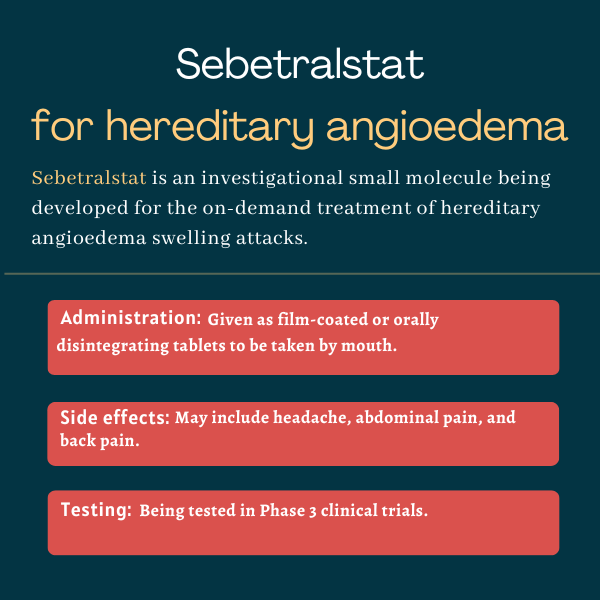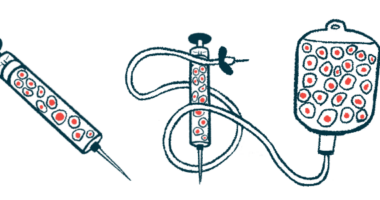Sebetralstat for hereditary angioedema
Last updated March 13, 2024, by Margarida Maia, PhD

What is sebetralstat for hereditary angioedema?
Sebetralstat, formerly known as KVD900, is an investigational small molecule being developed by KalVista Pharmaceuticals for the on-demand treatment of attacks of hereditary angioedema (HAE). It has been given as film-coated tablets to be swallowed or orally disintegrating tablets that dissolve quickly in the mouth without water.
Currently in Phase 3 clinical testing, sebetralstat has been granted fast track and orphan drug designations in the U.S. It also has been designated an orphan drug in the European Union, where a pediatric investigational plan has been approved.
Therapy snapshot
| Treatment name: | Sebetralstat |
| Administration: | Being tested in hereditary angioedema as film-coated or orally disintegrating tablets to be taken by mouth |
| Clinical testing: | In Phase 3 clinical testing |
How does sebetralstat work in hereditary angioedema?
Angioedema occurs when blood vessels leak fluid into the deeper layers of the skin or the mucous membranes lining organs or cavities in the body, resulting in repeated attacks of swelling that can arise anywhere.
In HAE, they generally are due to genetic mutations that impair the production or function of a protein called C1 inhibitor. This causes an enzyme called kallikrein to become overactive and trigger the production and release of large amounts of bradykinin. Too much bradykinin causes blood vessels to widen and leak fluid into tissues, resulting in swelling.
Sebetralstat is a small molecule designed to inhibit the activity of kallikrein in the blood. This is expected to bring swelling under control, reducing the severity and duration of attacks as they occur.
How will sebetralstat be administered in hereditary angioedema?
In clinical trials involving people with HAE, sebetralstat has been given as film-coated tablets at a dose of 300 or 600 milligrams (mg). An easier-to-use orally disintegrating tablet formulation of sebetralstat, which dissolves quickly in the mouth instead of being swallowed, has been tested in healthy adults.
Sebetralstat in hereditary angioedema clinical trials
Sebetralstat has been evaluated across a range of clinical trials involving both healthy volunteers and HAE patients. The therapy is currently in Phase 3 clinical testing.
Phase 1 trials
A Phase 1 clinical trial (NCT04349800) tested the safety, tolerability, and pharmacokinetics (movement into, through, and out of the body) of capsules or film-coated tablets of sebetralstat, at single ascending doses ranging from 5 to 600 mg, against a placebo in 84 healthy adults, ages 18 to 55.
Sebetralstat was well tolerated at doses as high as 600 mg. At that highest dose, sebetralstat achieved sufficient concentrations in the blood in less than 20 minutes after dosing and maintained greater than 95% inhibition of kallikrein for up to 10 hours. Compared with capsules, the film-coated tablet formulation entered the bloodstream more quickly.
Results from another Phase 1 clinical trial in 36 healthy adults showed that a single dose of 500 or 600 mg of an orally disintegrating tablet formulation of sebetralstat was processed by the body in a similar way to a 600 mg film-coated tablet. Both doses of the orally disintegrating tablet formulation were safe and well tolerated.
Phase 2 trial
A two-part Phase 2 clinical trial (NCT04208412) tested the safety and efficacy of sebetralstat in 68 adults with HAE type 1 or 2, ages 19 to 68, who had experienced at least three swelling attacks in the previous three months. In the first part, all patients received a single dose of 600 mg of sebetralstat to evaluate its pharmacokinetics. In the second part, patients were randomly assigned to receive either a 600 mg film-coated tablet of sebetralstat or a placebo within one hour of the start of the first attack; to treat a second attack, those who had previously taken sebetralstat were given a placebo, and vice versa.
The clinical trial met its main goal of reducing the use of rescue medication within 12 hours of dosing with sebetralstat versus a placebo (15.1% vs 30.2%). In addition, sebetralstat reduced the median time to symptom relief (1.6 vs. nine hours with a placebo). Relief was defined as patients feeling at least a little better for two consecutive time points within 12 hours of dosing, as reported by the Patient Global Impression of Change (PGI-C) scale. Sebetralstat also helped to relieve both abdominal and peripheral swelling, and no serious side effects were reported.
KONFIDENT Phase 3 trial
A fully enrolled and now completed Phase 3 clinical trial, called KONFIDENT (NCT05259917), evaluated the safety and efficacy of sebetralstat in 136 adults and adolescents, ages 12 and older, with HAE type 1 or 2, who were recruited at more than 60 sites across 20 countries. All patients received on-demand treatment for three swelling attacks, one each with 300 or 600 mg of sebetralstat or a placebo given in random order.
The trial’s main goal was to watch for changes in the time needed for the start of symptom relief, again defined as patients feeling at least a little better for two consecutive time points within 12 hours of dosing on the PGI-C scale. Other goals included evaluating time to attack resolution within 24 hours, and the proportion of attacks whose symptoms were relieved within 12 hours of dosing.
Top-line data from KONFIDENT showed that patients given either dose of sebetralstat started experiencing symptom relief much faster than those given a placebo. Specifically, the median time to the beginning of symptom relief was 1.61 hours in patients given 300 mg of sebetralstat, and 1.79 hours in those treated with the 600 mg dose. In patients given a placebo, the median time to symptom relief was 6.7 hours. Swelling attacks also resolved faster in sebetralstat-treated patients than in those on a placebo.
Additional KONFIDENT data demonstrated that a single dose of sebetralstat was sufficient to kick-start symptom relief, ease severity, or completely resolve the majority of treated swelling attacks.
Findings from the KONFIDENT trial, which concluded in December 2023, are expected to support the submission of an application seeking the approval of sebetralstat in the U.S. KalVista also plans to file for approval in the European Union and Japan later this year.
Ongoing trials
Patients who completed KONFIDENT were invited to enter its two-year open-label extension, called KONFIDENT-S (NCT05505916), which is recruiting up to 150 adults and adolescents, ages 12 and older. All will receive on-demand treatment with 600 mg of sebetralstat, given as two film-coated tablets of 300 mg each. The study’s main goal is to record the proportion of patients who experience at least one side effect from sebetralstat for up to two years. Other goals of the KONFIDENT-S extension, expected to conclude in early 2026, include assessing the time to symptom relief or attack resolution within 12-24 hours of dosing.
A subtrial (NCT05511922) also will evaluate the pharmacokinetics of 600 mg of sebetralstat for up to six hours after dosing in 12 adolescents, ages 12 to 17, enrolled into the KONFIDENT-S extension.

Common side effects of sebetralstat
Side effects reported with sebetralstat during clinical testing include headache, abdominal pain, and back pain. There were no serious side effects and all patients tolerated sebetralstat well.
Angioedema News is strictly a news and information website about the disease. It does not provide medical advice, diagnosis or treatment. This content is not intended to be a substitute for professional medical advice, diagnosis, or treatment. Always seek the advice of your physician or other qualified health provider with any questions you may have regarding a medical condition. Never disregard professional medical advice or delay in seeking it because of something you have read on this website.
Recent Posts
- Even when you do everything right, things can still fall apart
- Man develops acquired angioedema after cord blood transplant
- Number of attacks, severity is high in HAE patients in Canada
- Orladeyo approved in Brazil for HAE patients 12 and older
- Swelling in woman with idiopathic angioedema eased with omalizumab
Related articles





